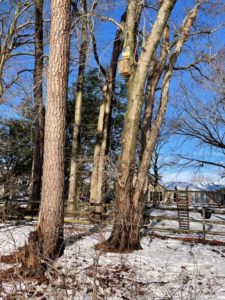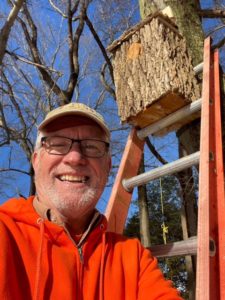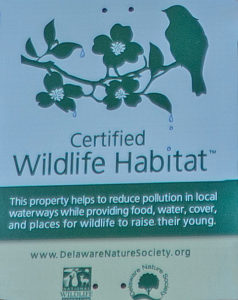Wildlife Habitat

(l-r) Christopher Edginton, Donna Hoyt, John Sykes, Alice Mohrman from Abbott’s Mill Nature Center in Milford, and Margaret M. Keefe
UUSD Named a Certified Wildlife Habitat®
UUSD has been designated a Certified Wildlife Habitat® by the National Wildlife Federation (NWF), which is administered locally by the Delaware Nature Society. The designation recognizes the congregation has fulfilled the requirements of the NWF’s Garden for Wildlife program by creating gardens and landscape features that support birds, butterflies, bees, frogs, and other local wildlife. UUSD has also met the requirement for each Certified Wildlife Habitat organization to provide natural sources of food, water, cover, and places to raise young, and is maintained in a sustainable way that incorporates native plants, conserves water, and does not rely on pesticides. The certification was presented on Sunday, November 4, 2018 by Alice Mohrman from Abbott’s Mill Nature Center in Milford, DE.
John Sykes said, “Unitarian Universalism’s Seventh Principle encourages us to have “respect for the interdependent web of all existence” and care for the immediate habitat is an expression of this Principle. For several years, our congregation has strengthened the connection between spiritual practice and Earth consciousness, and has engaged in community action on environmental issues. We also have been awarded Green Sanctuary status by the Unitarian Universalist Association, a program that helps bring congregational culture into greater alignment with long-term, environmentally-aware faith practice. And, many energy-efficient features were incorporated into the construction of our new sanctuary, including 103 solar roof panels that generate an average 97% of our electricity.”
Soon after we moved into our new building in 2015, the UUSD Landscape Committee adopted a grdening philosophy, again based on our 7th Principle mentioned above. This philosophy includes incorporating native plants, choosing natural ways to overcome weeds and harmful insects and disease, and generally working with nature to make our property beautiful and environmentally healthy. In January 2022, Ray Burton placed an Eastern screech owl nesting box on a tree near the pond so we hope to add an owl family to our wonderful community. We also have a bat box near the pond.


“Anyone, anywhere can restore wildlife habitat right in their own yards and communities,” said NWF Naturalist, David Mizejewski. “Whether you garden in a suburban yard, an urban area, or a rural plot of land, you can make a difference for local wildlife. Creating a Certified Wildlife Habitat environment is the perfect grassroots way to think globally and act locally to help birds, butterflies, bees, and other wildlife.” Celebrating 45 years this spring, the Garden for Wildlife movement has recognized over 217,000 gardens and landscapes across the US, encompassing more than 2.5 million acres that support wildlife.
 To certify a wildlife-friendly space in your yard, school, or anywhere, in your community, the Delaware Nature Society will provide one free site visit and consultation. For questions, or to schedule a free consultation, call 302-239-2334 ext. 142, or visit www.denature.org/cwh. Participants who have their wildlife habitat garden certified receive a certificate suitable for framing, a one-year membership to NWF with a subscription to National Wildlife magazine, a subscription to the Garden for Wildlife e-newsletter, a 10 percent discount to National Wildlife catalog, and the exclusive right to post a Certified Wildlife Habitat yard sign.
To certify a wildlife-friendly space in your yard, school, or anywhere, in your community, the Delaware Nature Society will provide one free site visit and consultation. For questions, or to schedule a free consultation, call 302-239-2334 ext. 142, or visit www.denature.org/cwh. Participants who have their wildlife habitat garden certified receive a certificate suitable for framing, a one-year membership to NWF with a subscription to National Wildlife magazine, a subscription to the Garden for Wildlife e-newsletter, a 10 percent discount to National Wildlife catalog, and the exclusive right to post a Certified Wildlife Habitat yard sign.
